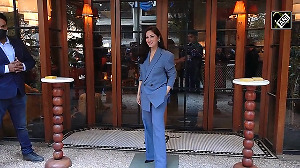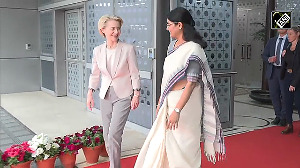In spite of the ceasefire with the Maoists, sustained peace, return of democracy and internal stability are a long way off in Nepal. At an Indo-Nepal seminar in New Delhi earlier this year, Foreign Secretary Kanwal Sibal, in his personal capacity, worried that Nepal was being likened to a failed state, thereby inviting foreign activism in the country which was a concern for India. He stressed the need for 'transparency and consultation' to deal with the difficult situation.
How did Nepal hit a cul de sac? Before it got there, it felt numerous shocks and surprises. The bombshell was the tragic palace massacre. The mystery is: Why did the late King Birendra not mobilise the Royal Nepal Army against the Maoists for so long? The other surprise was the sudden dissolution of the House on May 22, 2002 which is the cause celebre of the current impasse and derailment of democracy.
The dismissal of the Sher Bahadur Deuba government, the appointment of the palace-nominated government, the agreement for a ceasefire and talks with the Maoists are all from the same box of surprises. One view is that the present scenario has been choreographed by King Gyanendra who wants to usher in a new monarchy in Nepal to restore the credibility of a monarchy rocked by the lethal cocktail of drugs, passion and Famous Grouse.
If the king has, in the words of former Prime Minister G P Koirala 'high ambitions,' what is his game plan? Ever since he succeeded his brother, King Gyanendra has been telling Indians particularly that he is a 'constitutional monarch' and that he knows 'the limits to his power.' The Indian leadership had bought this line as at the best of times Delhi is oblivious to the ground realities in Kathmandu. So was former PM Sher Bahadur Deuba. He was so confident of his 'palace connection' and the trust of the king that he failed to see the writing on the wall. When asked in June last year whether elections could be held, he shot back: 'Of course.' Would the king remove him the way his father had removed B P Koirala in 1960? 'Of course not' was his reply.
So naive and gullible was Deuba that his dismissal was portrayed as a relief from inefficiency and corruption. Once parliament stood dismissed and the Maoist threatened to blast the elections, a royal takeover was inevitable.
Some of the king's actions have not been regarded as being above board. Look at two events: The king accepted Deuba's recommendation to dissolve the House conscious of the attendant risks and uncertainties. He knew that elections could not be held till the Maoists were brought around. Sure enough, this led to Deuba asking for a postponement of elections, the cue for the king to use the guillotine.
Article 127 requires the king to 'remove difficulties.' Instead he removed the PM and with him, a floundering democracy. The king's actions were unarguably legal and constitutional though it is questionable whether they were taken in national interest or in the interest of monarchy. Some can argue that given the super mess created by politicians, the monarch acted in good faith and in the enlightened self-interest of Nepal.
Where does this take the king? There are now no limits to his power. He is an absolute monarch. The government, RNA and bureaucracy are all under his command. He has reopened lines with the Maoists. The ceasefire according to Maoist supremo Prachanda [whose real name is Puspa Kamal Dahal], was negotiated directly with the king. All this is a big achievement for him. He is pragmatic enough to understand that he cannot go back to 1960.
By contrast, the Maoist intentions are less clear. Their political objective is to seize power though the revolutionary goal has been wavering. They are not unfamiliar with democracy. In 1991, they had 11 seats in parliament. They say they are prepared to make short term compromises to achieve their ultimate goal which was a republican form of government. It seems they have shelved that demand, a concession reported to have been made during the third round of peace talks with the government in November 2001.
Their achievements are impressive. They have dislodged democracy, and reinforced monarchy, the very institution they had pledged to crush and effectively control more than half the state with a parallel government. Their military has demonstrated the capacity to stage spectacular attacks against security forces anywhere, any time. It is after establishing their moral ascendancy that they offered to talk but waited for Deuba to go in order to open dialogue with the king.
What is the Maoist game plan? Prachanda, in an interview last year to The Far Eastern Economic Review, noted that the strategic stalemate should not drag on for too long. He was drawing a lesson from Peru. He is right, because time is not on his side.
Sooner than later, the RNA and the state will be bolstered to contain and marginalise the Maoists. Without external support and sanctuaries, they cannot win the revolutionary war.
There are two possibilities: first, that the Maoists are buying time for the final offensive and the current ceasefire and talks which are yet to begin are tactical. Secondly, they think they can do a deal with the king and get the best terms from him. Their demands are a. round table conference with political parties; b. an interim government; c. elections to a constituent assembly.
It is highly unlikely they can emulate the ruling Shah dynasty's conquest of Kathmandu 200 years ago. Therefore, their political demands merit scrutiny. The first two are easy. It is the third, which is the sticking point.
Maoist leader Baburam Bhattarai, not known for consistency recently said: 'We will support whoever is in power. History will reassess the role of King Gyanendra if he supports his grandfather, King Tribhuvan's pledge for a constituent assembly.'
But this demand was rejected in 1957. A constituent assembly will unravel the role of monarchy. Assuming the Maoists can strike a deal, the country would exist in an extended political and constitutional vacuum, power presumably shared between the Maoists or their proxies and the monarch with the king calling the shots. This state of flux could last two to three years and more.
But before the stage is set for political negotiations, the unstructured ceasefire effective since January 29 has to be formalised and CBMs [confidence building measures] initiated.
The government has so far apparently conceded all the demands of the Maoists: removing price tag and terrorist label, disclosing the location of comrades held in custody, no decommissioning of weapons and no killing of supporters. The latest demand is for the RNA to return to barracks and freeze on military operations. But who knows, a compromise may be found as the king is the supreme commander of the RNA.
The Maoists had set out on their long march with 43 demands, adding and dropping one or two as they went along. Most of these have been met or are implementable. In any future compromise with the Maoists on the question of monarchy, the king may be willing to yield on: a. rule of succession to be approved by Parliament; b. civilian control of the army. The RNA is not a people's army but a royal force owing allegiance first to the king and then to the country. Former foreign minister Chakra Bastola observed: 'Why should the army defend democracy when its task is to protect the king?'
The king could always bargain for a constitutional reform/review commission in place of a new constitution. At the end of the day the king has to remember that monarchy can only survive with multiparty democracy.
India has a big security stake in the political stability of Nepal. No other country had reservations on the royal takeover of October 5, last year. The Chinese called it an internal affair. India, which had led democracy drift and Maoists have a free run, was constrained to note belatedly that multiparty democracy and constitutional monarchy are twin pillars of stability in Nepal. As India took to sermonising, the US, UK and even the EU adopted a frontline profile in Kathmandu. India's reaction to the ceasefire was staid.
Tongue in cheek, a Nepalese analyst noted that India had failed to intervene in Nepal in accordance with the 1950 Treaty. Ironically it is the evergreen US-UK combine reportedly encouraged by the palace that has outpaced India in its own front yard in shaping the prescriptive advice for Nepal even as the monarchist-Maoist duo keeps democracy on drip.
With no contact with the Maoists, no influence over political formations and the king following his own counsel, options for India are few. It is good that Sibal has belatedly asked a few questions. King Gyanendra's sincerity and motives are as much in doubt as the immediate and long term objectives of the Maoists.






 © 2025
© 2025